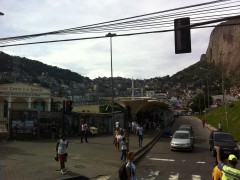Sustainable cities for the future: reimagining the individualist paradigm
We often take cities for granted. We debate the merits of one city versus another, comparing and contrasting the amenities, atmosphere, location, and opportunities available to us. Those of us who worry about our ecological footprint are also well aware that density is generally more sustainable than sprawl, and therefore that living in the urban core of a city is perhaps more desirable to living in suburban areas. But cities are much more than just a collection of buildings. As with all environmental policy decisions, there are significant and major tradeoffs that must be made in city planning – tradeoffs that do not immediately come to mind.
Rio+20 and its focus on sustainable development was therefore a particularly appropriate venue to air these concerns – especially through side events, which are discussion and presentation sessions organized by civil society to provide a supplement and sometimes a counterpoint to negotiations. The Ford Foundation organized a side event called Sustainable Cities to provide a forum to begin the discussion and to discuss best practices from around the world. My own interests have never extended to cities, but attending this side event, I found myself captivated by the discussion, because the tensions evident within city planning are repeated at every level of environmental policy and decision-making.
Prioritizing density often proves troublesome. For example, it risks disenfranchising the poorest segments of society, which find themselves unable to afford high-rise developments. Furthermore, the private sector will inevitably aim to maximize its profit margins, meaning that it will likely prioritize areas with the lowest land prices – and so we have an unavoidable conflict between location, economic development, and social equity.
This is a common occurrence: in most cities, the poor find themselves relegated to the outskirts of the city or to the worst, most marginal neighbourhoods – at least until developers run out of desirable land and begin to target these areas, while government often does little to counteract the situation.
Yet this is not by any means the only dynamic: the city of today and tomorrow must cope with a slew of tensions. In Baghdad, for example, an influx of rural migrants bring with them rural customs and crimes that are at odds with city life – leading in some cases to ‘double migration’, a phenomenon in which higher income populations are displaced from the city by lower income immigrants. And many cities – especially those on coasts – must realize that climate adaptation is critical: our previous city plans and urban designs were tailored to a climate regime which will likely soon be outdated.
Politics, narrow thinking, laissez-faire economics, and an individualistic approach to community life – among others – have undoubtedly contributed to the current situation, but the question we are now faced with is what approach we should take to remedy it. Panelists at the side event were of the opinion that we cannot rely on laissez-faire economics to solve our problems. There is a place for the private sector, to be sure; but in order to create truly sustainable and just city, checks and balances must be put into place, and a foundation of readily available services must exist. Planners in particular will be forced to take into account land use conflicts and perhaps even to preemptively address them, while simultaneously balancing social and economic goals. Public transportation is and will continue to be an essential component of a metropolitan city. But perhaps most fundamentally, a paradigm shift to a city based on the commons and commonality, rather than an assemblage of private places – and perhaps even from individual, market-transacted property to traditional or pluralist systems of tenure – may be required.
Tags: Cities, Development, ENVIRONMENT, migration, urbanization


